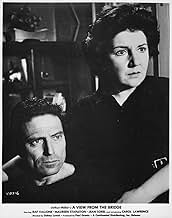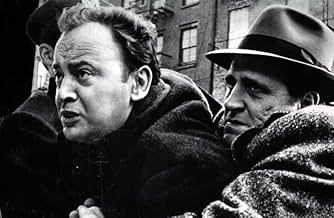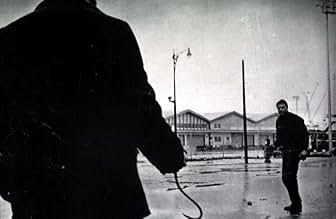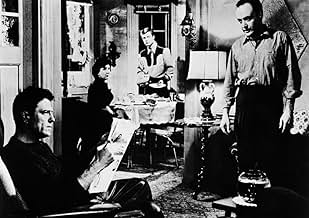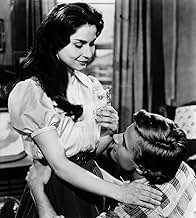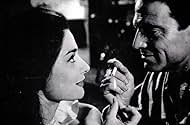Ajouter une intrigue dans votre langueEddie harbors secret love for his niece Catherine. When her cousins, illegal immigrants Marco and Rodolpho, arrive, Catherine falls for Rodolpho. Eddie, consumed by jealousy, reports the imm... Tout lireEddie harbors secret love for his niece Catherine. When her cousins, illegal immigrants Marco and Rodolpho, arrive, Catherine falls for Rodolpho. Eddie, consumed by jealousy, reports the immigrants, leading to tragic consequences.Eddie harbors secret love for his niece Catherine. When her cousins, illegal immigrants Marco and Rodolpho, arrive, Catherine falls for Rodolpho. Eddie, consumed by jealousy, reports the immigrants, leading to tragic consequences.
- Réalisation
- Scénario
- Casting principal
- Récompenses
- 1 victoire au total
Michel Mourlet
- Extra
- (non crédité)
Avis à la une
A View From The Bridge transcends its stage-play roots to give an earthy feel for its neighborhood and its neighbors. This is high praise considering the play is one of Arthur Miller's very best to begin with. The chemistry is devastatingly hot between Raf Vallone and his illicit love for niece Carol Lawrence who, at first admires him, but later turns on him with disgust. Maureen Stapleton is magnificent as Vallone's desperate wife. Vincent Gardenia is disarmingly young in an early role. The cinematography seems to peel the layers of this blue-collar area like an onion, and the score is simply perfect. A View from the Bridge is a neglected classic that needs to be restored to prominence.
Based on a play by Arthur Miller, the film is very typical of its era (where many such classic plays were adapted for the screen) but also characteristic of director Lumet - who was constantly striving to push barriers (among the themes touched upon here are incest and homosexuality!) and always put his greatest emphasis on the acting. In fact, the cast here is an eclectic but surprisingly effective mix of American, French and Italian actors (though set in Brooklyn, the film was actually shot in France!) - with Raf Vallone especially impressive in his difficult role. The film's dock-side setting (gloomily photographed by Michel Kelber) recalls, to a certain extent, ON THE WATERFRONT (1954) - though this is more of a domestic melodrama; still, the final confrontation between Vallone and Raymond Pellegrin (with its tragic aftermath) reaches a fine pitch of tension.
This comes from a particularly satisfying period in the career of Sidney Lumet. Based upon one of the masterpieces of American theatre, the exteriors are filmed in his beloved New York whilst the interiors are shot in France. It is a Franco-Italian production and having the three leading male protagonists speaking in broken English contributes immeasurably to the films authenticity.
It is pretty faithful to the original apart from the ending and in changing the role of the lawyer Alfieri from that of Greek chorus to the voice of reason. Longshoreman Eddie Carbone has no time for reason as he is ruled by the heart and not the head. Like so many tragic characters he is basically a decent man whose fatal flaw, in this case, his improper love for his teenage niece, destroys him.
Carbone here is played by ex-footballer Raf Vallone who belongs to that rare breed: a hunk who can act. He has given some strong portrayals in his time, notably in Dassin's 'Phaedra', but this powerhouse performance has it all and he is fully deserving of his David di Donatello award.
One of playwright Arthur Miller's favoured devices is to have what appears to be a happy domestic scene shattered by a catalyst which in this piece is the arrival of two of Mrs. Carbone's cousins from Italy. They are illegal immigrants but Eddie agrees to put them up and get them jobs on the docks. Tensions mount however as Carbone's beloved niece falls for one of them.......
The immigrants Marco and Rodolpho are played superbly by Raymond Pellegrin and Jean Sorel. This is, to my knowledge, Pellegrin's strongest role and Sorel of course was always underrated because of his impossibly good looks. Another performance to treasure is that of Carol Lawrence as the niece. An all round actress/singer/dancer she was denied the chance of reprising on screen her award winning stage role as Maria in 'West Side Story' and although on paper a wee bit too old for the part of Catherine, gives a magnificent performance. Sadly, this is her only film. As Mrs. Carbone we have the accomplished Maureen Stapleton, who combines strength and vulnerability. Mention must also be made of Morris Charnovsky as Alfieri. An excellent actor whose film career was scuppered after being 'named' by Elia Kazan to the HUAC.
Historically there is a strong connection between Kazan's 'On the Waterfront' and Miller's play, for those who care to look it up. Whereas in Kazan's film to inform is an act of heroism, here it is merely an act of betrayal.
Lumet's legendary skill with actors, Norman Rosten's screenplay, Michel Kelber's gritty cinematography and the beautifully understated score of Maurice Le Roux have given us a raw, stark, passionate, searing and visceral film which also seems to have served the playwright well. Let us hope Mr. Miller approved.
It is pretty faithful to the original apart from the ending and in changing the role of the lawyer Alfieri from that of Greek chorus to the voice of reason. Longshoreman Eddie Carbone has no time for reason as he is ruled by the heart and not the head. Like so many tragic characters he is basically a decent man whose fatal flaw, in this case, his improper love for his teenage niece, destroys him.
Carbone here is played by ex-footballer Raf Vallone who belongs to that rare breed: a hunk who can act. He has given some strong portrayals in his time, notably in Dassin's 'Phaedra', but this powerhouse performance has it all and he is fully deserving of his David di Donatello award.
One of playwright Arthur Miller's favoured devices is to have what appears to be a happy domestic scene shattered by a catalyst which in this piece is the arrival of two of Mrs. Carbone's cousins from Italy. They are illegal immigrants but Eddie agrees to put them up and get them jobs on the docks. Tensions mount however as Carbone's beloved niece falls for one of them.......
The immigrants Marco and Rodolpho are played superbly by Raymond Pellegrin and Jean Sorel. This is, to my knowledge, Pellegrin's strongest role and Sorel of course was always underrated because of his impossibly good looks. Another performance to treasure is that of Carol Lawrence as the niece. An all round actress/singer/dancer she was denied the chance of reprising on screen her award winning stage role as Maria in 'West Side Story' and although on paper a wee bit too old for the part of Catherine, gives a magnificent performance. Sadly, this is her only film. As Mrs. Carbone we have the accomplished Maureen Stapleton, who combines strength and vulnerability. Mention must also be made of Morris Charnovsky as Alfieri. An excellent actor whose film career was scuppered after being 'named' by Elia Kazan to the HUAC.
Historically there is a strong connection between Kazan's 'On the Waterfront' and Miller's play, for those who care to look it up. Whereas in Kazan's film to inform is an act of heroism, here it is merely an act of betrayal.
Lumet's legendary skill with actors, Norman Rosten's screenplay, Michel Kelber's gritty cinematography and the beautifully understated score of Maurice Le Roux have given us a raw, stark, passionate, searing and visceral film which also seems to have served the playwright well. Let us hope Mr. Miller approved.
This play by Arthur Miller was filmed by Sidney Lumet in France, but why? Lumet brings us the gritty and dark world of immigrant longshoreman Eddie Carbone (Raf Vallone) and his family ... wife Maureen Stapleton and her niece Carol Lawrence. Carbone is involved in illegally bringing two Italians (cousins of Stapleton) into the US and getting them jobs on the wharfs of New York City. But something goes very wrong when the younger man (Jean Sorel) starts to get involved with Lawrence and Carbone's jealousy and lust for the girl come to the surface.
All the main characters live in a small and squalid apartment, the perfect setting for the pent up lust and anger that fuels the actions of the characters. The more Carbone lusts for the girl, the more he despises the young Italian and his "foreign" ways, hinting at his homosexuality because he is blond and likes to sing.
Vallone is superb as the volatile and treacherous Eddie Carbone who finally is consumed by his raging passions. Stapleton is solid as the aggrieved wife who remains loyal even as she slowly begins to understand her husband's actions. Jean Sorel is terrific as the young Italian as is Raymond Pellegrin as his older brother.
The real surprise here is Carol Lawrence as young Catherine. Generally considered a musical performer (WEST SIDE STORY), she turns in an amazing performance the innocent girl who finally comes of age.
Co-stars include Morris Carnovsky as the compassionate lawyer, Vincent Gardenia as the grocer, Harvey Lembeck, Frank Campanella, and Mickey Knox as co-workers.
All the main characters live in a small and squalid apartment, the perfect setting for the pent up lust and anger that fuels the actions of the characters. The more Carbone lusts for the girl, the more he despises the young Italian and his "foreign" ways, hinting at his homosexuality because he is blond and likes to sing.
Vallone is superb as the volatile and treacherous Eddie Carbone who finally is consumed by his raging passions. Stapleton is solid as the aggrieved wife who remains loyal even as she slowly begins to understand her husband's actions. Jean Sorel is terrific as the young Italian as is Raymond Pellegrin as his older brother.
The real surprise here is Carol Lawrence as young Catherine. Generally considered a musical performer (WEST SIDE STORY), she turns in an amazing performance the innocent girl who finally comes of age.
Co-stars include Morris Carnovsky as the compassionate lawyer, Vincent Gardenia as the grocer, Harvey Lembeck, Frank Campanella, and Mickey Knox as co-workers.
Eddie Carbone (Raf Vallone) a dockworker on the Brooklyn Navy yard accepts his wife's two cousins into his home so they may work and earn enough to return to Sicily prosperous. However when the younger brother Rodolpho (Jean Sorel) gets cozy with Eddie's beloved niece sparks fly and tragedy ensues.
Having never seen the original Miller play on which this is based I cannot compare this 1962 film adaptation by Sidney Lumet but from the film alone I can say it is quite an achievement. The low budget is obvious and many a time one feels as if they are watching an old television movie. But at the same time it adds another layer to the raw atmosphere of the piece. This is the Brooklyn of the 1950s where many struggle for a meager wage and are bound to the docks. Only culture and their traditions keep them alive and this film captures it all.
The cheap look also puts more emphasis on the actors to give their best and boy do they deliver, I could not account for 1 bad performance in this film with the leads routinely strong, particularly Vallone adding an authentic Italian touch, to the extras dotted with many true blue New York blue collar actors like Frank Campanella and Vincent Gardenia.
Being from an Italian family I can say this film captures many of the eccentricities and machinations of an Italian household from the dominant masculinity to family talks and fruit at the end of the meal. Lumet captures the cramped atmosphere so reminisced and glorified in many homes but here turned cold and repugnant due to the material of the piece. The film brilliantly draws the contrast between the old world Italian immigrant mindset of making and saving to go home (as expressed in the brother Marco in his strictly workman's cloths) and that of the younger, new immigrants who come to America to look for opportunity and pleasures not found at home (as expressed in Jean Sorrel with his bolo tie and Texas shirt). The film deals with old world adapting to new world in a larger passion play of lust and betrayal with emotions so sustained that shift to become so open and raw one is left gasping.
Just goes to show what can be accomplished with good actors and a fine director, another under regarded jewel in Sidney Lumet's crown.
Having never seen the original Miller play on which this is based I cannot compare this 1962 film adaptation by Sidney Lumet but from the film alone I can say it is quite an achievement. The low budget is obvious and many a time one feels as if they are watching an old television movie. But at the same time it adds another layer to the raw atmosphere of the piece. This is the Brooklyn of the 1950s where many struggle for a meager wage and are bound to the docks. Only culture and their traditions keep them alive and this film captures it all.
The cheap look also puts more emphasis on the actors to give their best and boy do they deliver, I could not account for 1 bad performance in this film with the leads routinely strong, particularly Vallone adding an authentic Italian touch, to the extras dotted with many true blue New York blue collar actors like Frank Campanella and Vincent Gardenia.
Being from an Italian family I can say this film captures many of the eccentricities and machinations of an Italian household from the dominant masculinity to family talks and fruit at the end of the meal. Lumet captures the cramped atmosphere so reminisced and glorified in many homes but here turned cold and repugnant due to the material of the piece. The film brilliantly draws the contrast between the old world Italian immigrant mindset of making and saving to go home (as expressed in the brother Marco in his strictly workman's cloths) and that of the younger, new immigrants who come to America to look for opportunity and pleasures not found at home (as expressed in Jean Sorrel with his bolo tie and Texas shirt). The film deals with old world adapting to new world in a larger passion play of lust and betrayal with emotions so sustained that shift to become so open and raw one is left gasping.
Just goes to show what can be accomplished with good actors and a fine director, another under regarded jewel in Sidney Lumet's crown.
Le saviez-vous
- AnecdotesThe screen play is based on the stage play "A View From the Bridge" by Arthur Miller which opened at the Coronet Theater on September 29, 1955 and ran for 148 performances.
- Versions alternativesTwo separate versions were filmed: one in English, the other in French.
- ConnexionsFeatured in Celluloid Closet (1995)
Meilleurs choix
Connectez-vous pour évaluer et suivre la liste de favoris afin de recevoir des recommandations personnalisées
- How long is A View from the Bridge?Alimenté par Alexa
Détails
- Durée1 heure 58 minutes
- Couleur
- Rapport de forme
- 1.37 : 1
Contribuer à cette page
Suggérer une modification ou ajouter du contenu manquant

Lacune principale
By what name was Vu du pont (1962) officially released in Canada in English?
Répondre

